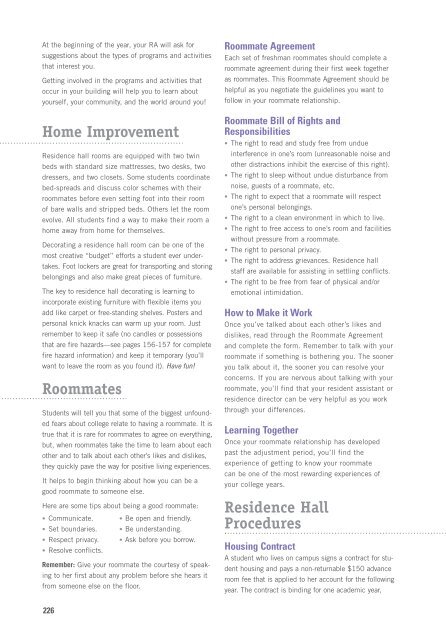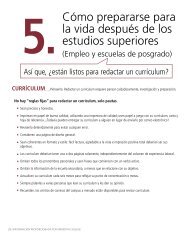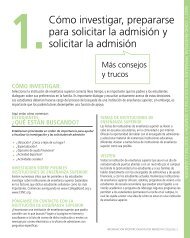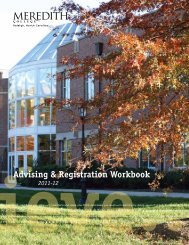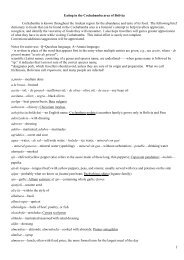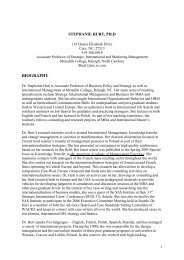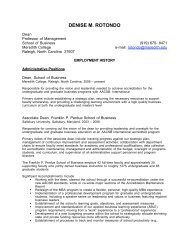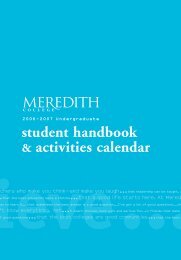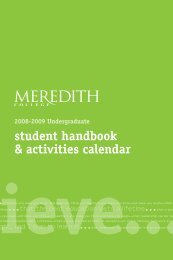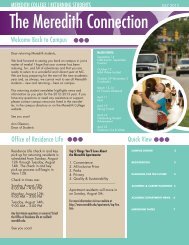You also want an ePaper? Increase the reach of your titles
YUMPU automatically turns print PDFs into web optimized ePapers that Google loves.
At the beginning of the year, your RA will ask for<br />
suggestions about the types of programs and activities<br />
that interest you.<br />
Getting involved in the programs and activities that<br />
occur in your building will help you to learn about<br />
yourself, your community, and the world around you!<br />
Home Improvement<br />
Residence hall rooms are equipped with two twin<br />
beds with standard size mattresses, two desks, two<br />
dressers, and two closets. Some students coordinate<br />
bed-spreads and discuss color schemes with their<br />
roommates before even setting foot into their room<br />
of bare walls and stripped beds. Others let the room<br />
evolve. All students find a way to make their room a<br />
home away from home for themselves.<br />
Decorating a residence hall room can be one of the<br />
most creative “budget” efforts a student ever undertakes.<br />
Foot lockers are great for transporting and storing<br />
belongings and also make great pieces of furniture.<br />
The key to residence hall decorating is learning to<br />
incorporate existing furniture with flexible items you<br />
add like carpet or free-standing shelves. Posters and<br />
personal knick knacks can warm up your room. Just<br />
remember to keep it safe (no candles or possessions<br />
that are fire hazards—see pages 156-157 for complete<br />
fire hazard information) and keep it temporary (you’ll<br />
want to leave the room as you found it). Have fun!<br />
Roommates<br />
<strong>Student</strong>s will tell you that some of the biggest unfounded<br />
fears about college relate to having a roommate. It is<br />
true that it is rare for roommates to agree on everything,<br />
but, when roommates take the time to learn about each<br />
other and to talk about each other’s likes and dislikes,<br />
they quickly pave the way for positive living experiences.<br />
It helps to begin thinking about how you can be a<br />
good roommate to someone else.<br />
Here are some tips about being a good roommate:<br />
• Communicate. • Be open and friendly.<br />
• Set boundaries. • Be understanding.<br />
• Respect privacy. • Ask before you borrow.<br />
• Resolve conflicts.<br />
Remember: Give your roommate the courtesy of speaking<br />
to her first about any problem before she hears it<br />
from someone else on the floor.<br />
226<br />
Roommate Agreement<br />
Each set of freshman roommates should complete a<br />
roommate agreement during their first week together<br />
as roommates. This Roommate Agreement should be<br />
helpful as you negotiate the guidelines you want to<br />
follow in your roommate relationship.<br />
Roommate Bill of Rights and<br />
Responsibilities<br />
• The right to read and study free from undue<br />
interference in one’s room (unreasonable noise and<br />
other distractions inhibit the exercise of this right).<br />
• The right to sleep without undue disturbance from<br />
noise, guests of a roommate, etc.<br />
• The right to expect that a roommate will respect<br />
one’s personal belongings.<br />
• The right to a clean environment in which to live.<br />
• The right to free access to one’s room and facilities<br />
without pressure from a roommate.<br />
• The right to personal privacy.<br />
• The right to address grievances. Residence hall<br />
staff are available for assisting in settling conflicts.<br />
• The right to be free from fear of physical and/or<br />
emotional intimidation.<br />
How to Make it Work<br />
Once you’ve talked about each other’s likes and<br />
dislikes, read through the Roommate Agreement<br />
and complete the form. Remember to talk with your<br />
roommate if something is bothering you. The sooner<br />
you talk about it, the sooner you can resolve your<br />
concerns. If you are nervous about talking with your<br />
roommate, you’ll find that your resident assistant or<br />
residence director can be very helpful as you work<br />
through your differences.<br />
Learning Together<br />
Once your roommate relationship has developed<br />
past the adjustment period, you’ll find the<br />
experience of getting to know your roommate<br />
can be one of the most rewarding experiences of<br />
your college years.<br />
Residence Hall<br />
Procedures<br />
Housing Contract<br />
A student who lives on campus signs a contract for student<br />
housing and pays a non-returnable $150 advance<br />
room fee that is applied to her account for the following<br />
year. The contract is binding for one academic year,


